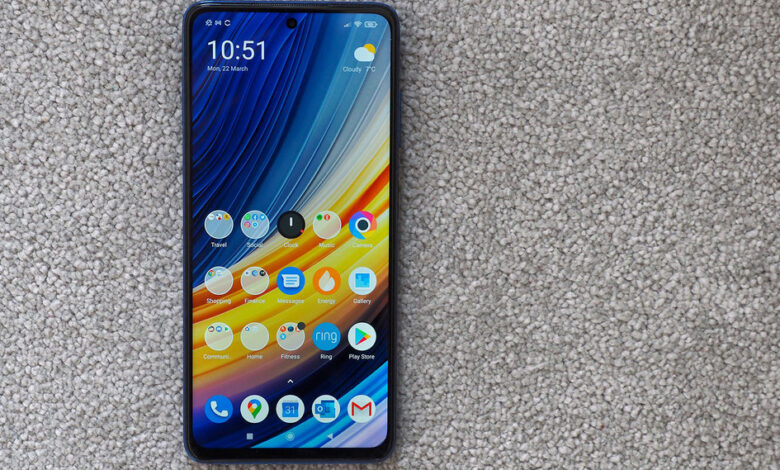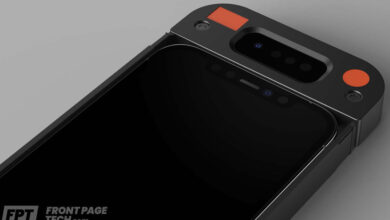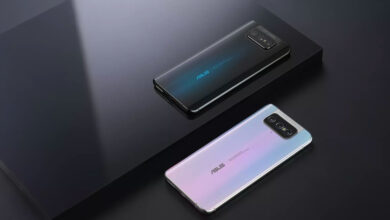Poco X3 Pro review: Is bigger better?

[ad_1]
The big ol’ beast upon which your eyes are affixed is the Poco X3 Pro: the Xiaomi offshoot’s sub-flagship device, here to tempt you with massive screen, massive battery, and not-so-massive price point.
Just a year after the Poco X2 launched, the X3 Pro isn’t exactly an unexpected surprise. But it does cut its own path: its the first device to feature the Qualcomm Snapdragon 860 processor, which is all-powerful (basically an 855+ rebadged) but, crucially, drops any 5G modem – and, with that, any battery/cost implication that such connectivity could cause.
As such, the Poco X3 Pro is a fairly unique prospect. It’s not quite as flagship grade as the smaller Poco F3 – which was announced the same day, here’s how the two compare – but as 4G/LTE handsets on a big scale go, it’s got a lot of weight behind it (both figuratively and literally speaking).
Design & Display
- Display: 6.67-inch DotDisplay panel, FHD+ resolution, 120Hz refresh, 450 nits
- Finishes: Phantom Black, Frost Blue, Metal Bronze
- Dimensions: 165.3 x 76.8 x 9.4mm / Weight: 215g
- Side-mounted fingerprint scanner
- 3.5mm headphone jack
As you’ve no doubt already figured out by now: the Poco X3 Pro is a big and weighty phone – even more so than its spec sheet might have you think. No, 215g is hardly a lot when you’re weighing out pasta for dinner or something, but in a phone that you handle constantly it’s noticeably chonky. It’s far more than the Redmi Note 10 Pro, for example, which has almost exactly the same footprint.

The big scale comes, in part, from this Poco’s big screen. This 6.67-inch ‘DotDisplay’ panel is sourced from Samsung, complete with many of the current nice-to-haves in a phone – namely the 120Hz refresh rate to keep the visual experience smoother. The Full HD+ resolution – that’s 2400 x 1080 pixles – might not sound top of the line, but it’s really as much as you’ll need and doesn’t negatively affect fidelity.
Flip the phone around and the rear design has a kind-of retro look about it. Phone design moves on so rapidly year on year that, for whatever reason, the Poco X3 Pro just looks a bit ‘last year’. Maybe it’s the raised camera unit, housed within a black circle, that’s behind the times. The big look-at-me Poco logo emblazoned on the back is way bigger than necessary, too.
There are some nice touches though. A 3.5mm headphone jack is on board, if you’re still using wired headphones. And the side-mounted fingerprint scanner – which doubles-up as the power button – is well placed for rapid login. Or, by the wonders of face unlock, you can feed the X3 Pro your face and get a speedy unlock that way too.

In summary: the Poco X3 Pro is massive, in a kind of gawky way that’s not at the forefront of phone design. But then it’s also practical, if you’re looking for a large phone, thanks to that massive screen and massive battery combination. And, really, that’s the most important take-away factor.
Performance & Battery
- Qualcomm Snapdragon 860 platform, 6GB/8GB RAM
- 5,160mAh battery, 33W charging
- 4G/LTE only, no 5G
There’s been heaps of chat about 5G over the last few years. For good reason, too, as it enables super-fast connectivity with low-latency. Except, it doesn’t if you can’t get a 5G singal – which, in majority of places around the world, is often the case. Not to mention the elevated asking price of your monthly mobile subscription.

The Poco X3 Pro bypasses any 5G problem by, well, shunning the connectivity entirely. That, it seems, is much the point of using the all-new Qualcomm Snapdragon 860 processor – there’s no X50/X55 series modem attached within the platform, thus no 5G. But 4G/LTE connectivity is perfectly good enough and, without the concern over elevated costs or battery consumption, we think it’ll be lapped up by many consumers.
Not to mention that the Snapdragon 860 is really rather powerful. It’s a lot like a rebaged Snapdragon 855+ from two years back – same eight cores, same clock speed (2.96GHz), same graphics chip – just minus the faster modem, as we said. In terms of performance, though, that means there’s little to nothing that’s going to bother this phone at all.
We’ve been living with the Poco X3 Pro as our own for a working week, digging into Zwift sessions (and Companion ones), playing South Park: Phone Destroyer, and generally milling about our suite of apps to browse, mail and watch videos. None of that has caused so much as a hiccup. It’s all a very smooth experience – often literally, thanks to the 120Hz display.

Having this double-speed refresh rate here makes a lot of sense as a more powerful processor can handle decent frame-rates in a variety of situations, from the user interface and software through to a myriad of apps, including games. Some makers have pushed faster refresh screens but then not paired a quite good enough processor to always make good on that hardware – the cheaper Moto G30 being one such example – but the Poco always delivers.
Without throttling battery saver features enabled, we’ve been cutting through 30 per cent of battery every 10 hours. That includes some casual gaming. It’s no surprise, really, as the Poco X3 Pro houses a 5,160mAh battery – which is massive by any measure. But a 30-hours-plus innings per charge would be no bother, making this one of those phones that’s close to being a two-dayer unless you’re really hammering out heavyweight apps a lot of the time.
There are some caveats to all this though. That comes down to Xiaomi’s MIUI software, which has a lot of detail when it comes to battery handling. By default every app is set to ‘Battery Saver’ – so you’re likely going to need to manually move your key apps to ‘No Restrictions’ to ensure they continue to function better than not.
| collection: | Poco X3 Pro MIUI software |
That said, the Poco X3 Pro still hits some walls. It’s persistently exhibited problems with notifications – much like we found with the Xiaomi Mi 11, albeit worse here – such as, for example, hour-long delays in WhatsApp notifications, plus delays with various other apps. In theory the software will learn which apps are most important to you – by volume and repetition of use – and permit those more access, but that’s not helped our overall experience.
Customisation can be a great thing, but it can also be a hindrance. We would rather MIUI was a just more gentle with its approach to limiting with apps. Why certain Xiaomi phones on the same software versions run fine – the Redmi Note 10 Pro being one example – but others do not, such as this Poco, is rather perplexing. Each has its own launcher, sure, but these ongoing notification issues are a needless irritation.

Which is why this more laborious setup won’t be distracting those with a little more budget from buying into, say, a Google Pixel phone with stock Android software, or something like a Motorola handset instead (likely foregoing some power for the sake of user experience).
Cameras
- Quad rear cameras:
- Main: 48-megapixel, f/1.79 aperture, 1/2in sensor size
- Wide-angle (119 degrees): 8MP, f/2.2
- Macro: 2MP, f/2.4
- Depth: 2MP, f/2.4
- Front-facing camera:
- 20-megapixels, f/2.2 aperture
Whereas many are now pushing 108-megapixel cameras as the norm, Poco is a little further down the ladder with the X3 Pro, instead opting for a 48-megapixel main sensor. This functions by using four pixels in one, to produce 12-megapixel results. Which are fairly decent quality overall, including in a mix of conditions, with a usable Night Mode too.

Move away from that main sensor, however, and the X3 Pro isn’t especially ‘pro’ in its sell. There’s an 8-megapixel wide-angle that, while useful, is of limited quality – as is typical at this level, really.
But it’s the pair of other cameras – both 2-megapixel sensors – to cover depth readings and macro close-ups that are throwaway. They’re of limited use, don’t need to be here, and are on board to up the count and lure you in with the “quad camera” pitch. Macro is so hidden that you’ll never know to use it, which is a good job as the results are poor.
| collection: | Poco X3 Pro cameras |
Pare the X3 Pro’s camera spec down and it’s got a perfectly fine main lens, then, but that’s about as far as things go. It’s fairly typical of this level, though, so isn’t a surprise – but consider that “quad camera” claim as and oversell and your expectations may be met.
[ad_2]
Source link





